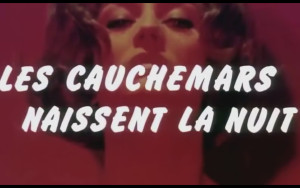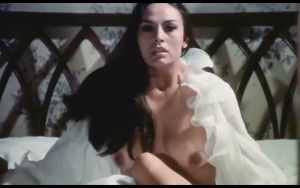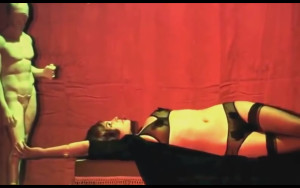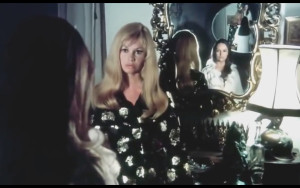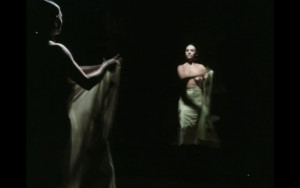Fascination (1979)
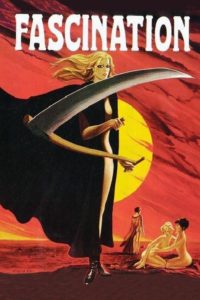
But first a riddle:
What’s black and white and red all over?…
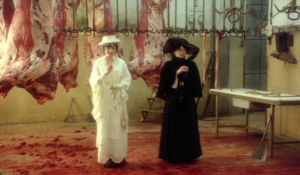
Two women in a slaughterhouse!
This shot from the first five lingering minutes of Fascination pretty much sums up our mostly-beloved director Jean Rollin’s style in a nutshell. It’s a beautifully framed and colored piece of bizarre art, a charming, macabre, drawn-out, actionless spectacle to behold. As with most art for art’s sake, it means nothing except what the viewer decides it means after staring at it for too long. That said, if you want a slow, subtitled stroll through some castles, vampires and tits, Jean is your guy.
This was the second Jean movie we had seen, and the most noticeable thing about him other than his film editing philosophy of “never cut” is that he is a mind reader. About the time you’re thinking “god this is boring…. she should take her clothes off,” or “I think the dog should save them,” it happens, in front of you, as if bidden by your very own private thoughts. This dipping in and out of your inner-voice makes his extended takes and pretty decent cinematography even more hypnotizing and startling at times, one might even say… Fascina-NOPE, not doing that. Thank you.
On with Fascination:
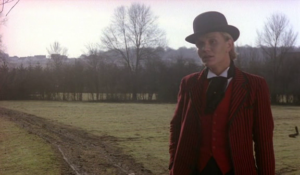 In the early 1900’s, a band of thieves are betrayed by their guy-from-Clockwork Orange cohort, who escapes their guild with a box of pilfered gold. With the less stylish crooks in hot pursuit, he decides to hide out in a beautiful mansion and finds it occupied by two women, Eva and Elisabeth.
In the early 1900’s, a band of thieves are betrayed by their guy-from-Clockwork Orange cohort, who escapes their guild with a box of pilfered gold. With the less stylish crooks in hot pursuit, he decides to hide out in a beautiful mansion and finds it occupied by two women, Eva and Elisabeth.
This is a common thread in Jean’s movies – the criminal or streetwise/cynic protagonist escapee (possibly representing naïve realism/humanity if you wanna get into all that shit) stumbling into a mansion of metaphysical importance (symbolizing a mansion of metaphysical importance.)
Also prominently featured in ‘Jean movies’ are a set of twin… minxes? What do you call a thing that looks like a girl or woman but is clearly just a vampire wanting to eat you? My ex-wife! ha! Um.
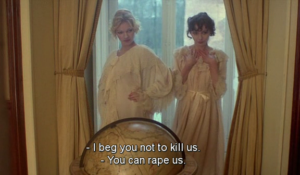
Eva and Elisabeth don’t seem too alarmed about being held captive at gunpoint, and keep mentioning that the owner of the mansion will be coming home that night and that the thief should be long gone by then.
He locks them in a room and they decide to have lesbian sex while they wait out the next beat of the plot–the kind of moment where you’re not sure if the movie told you to want this, or if you wanted it all along and Jean just read your thoughts and gave you lesbians.
Aftersex, they leave their room because they had a spare key all along, and play games turning the tables on their armed captor, Eva once again advocates for her own rape, successfully this time, while Elisabeth steals the thief’s gun, but in her unguarded moments seems a bit jealous of her lover being shared, and paradoxically, also a bit concerned for the well-being of the man who is (completely consensually) raping her lover.
Afterrapewhich, Elisabeth once again warns the thief that death is coming to that house and that he should fucking get the hell out, to which he doesn’t reply.
The besieging bandits force an exchange of the stolen-stolen gold, and Eva nonchalantly proffers herself for rape once again but then proceeds to reap the entire band of miscreants, hence this movie’s glorious cover art – the shot that made you say, “fuck yeah, I’ll watch that!”
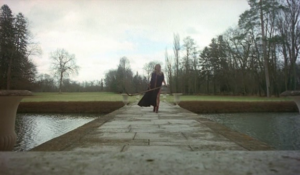
Though Eva has fervently lain with our misogynistic hero, only Elisabeth seems to truly care about his dumb ass, constantly warning him that he should leave the mansion and that Eva is trying to stall him from leaving; this perversely intrigues the fool to stay and see what will happen next, and after sunset the mistress of the mansion arrives.
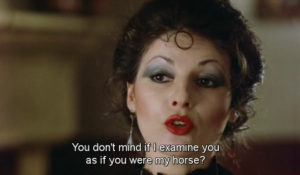
We quickly get the sense that our thiefy protagonist is a mouse cockily flirting with a harem of cats who are all speaking of ‘having him for dinner’. And after he makes some quip about how silky and feline their fur is, they say again ‘look, we’re gonna eat you, just so you know’, to which he smiles, shakes his mousey head and sips some wine.*
*At a certain point all analogies break down, it’s just how they work.
The rest of the coven arrives, in full seance gear, telling him flat out that he will die, they worship death, this is their annual sacrifice, and these are his final hours. He takes this all very lightheartedly and asks no questions of any relevance, apparently thinking it’s all a joke (“its all” in this sentence refers to women, spirituality, ritual murder, and his own life.) This is one of the movies that cemented our habit of yelling ‘”What do you mean?” He promptly asked.’ at the screen.
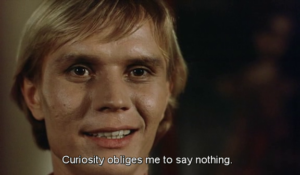
Only when he finds the murdered corpse of one of the bandits does he decide he’s not having fun anymore and begins to leave.
Eva is sent to axe him (yes literally, because it’s that kind of movie) but is betrayed by Elisabeth, the bitch, and shot. Her blood attracts the coven who choose to eat her instead of their victim or traitor.
Elisabeth flees with Dickwad before she realizes she loved Eva and never loved him so she shoots him too, and is accepted back into the mansion after reporting that he killed Eva and she avenged her.
The downright joy we get from most of Jean Rollin’s movies comes from the fun he has with his vampires: we love vampires and his are some of the best in the biz (technically the women in this movie are never explicitly called vampires–they might just be a cult of women who upgraded from cow to human blood, but, Palm or Christmas, a tree’s a tree.) Surprisingly unique in each of his movies, his takes on blood-drinkers and their supernatural kin are usually just damn interesting, and fit well with his directorial style that teeters between plodding and dreamlike.
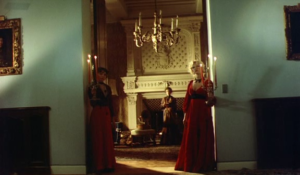 When confined to interior sets, Jean likes symmetry and color, like a slightly less annoying Wes Anderson.
When confined to interior sets, Jean likes symmetry and color, like a slightly less annoying Wes Anderson.
Jean has a good eye for castles, graveyards, and other ruinous environments he finds in France, these are often wide shot and blandly lit or colored, and given small, brightly costumed people wandering through them. It seems in a visual sense he gets joy from giving life to a crypt, by sowing bright actors in a desolate field. This usually lends itself to fun composition, as a small dot of light will travel from one end to the other of a bland wasteland – can you see why he “gets” vampires yet? – and his inability to yell ‘cut!’ to end a shot makes you marinate in his world and start to accept a slower pace that either makes you feel relaxed and artsy or bored and frustrated (sometimes a bit of both) depending on why you came to his films.

